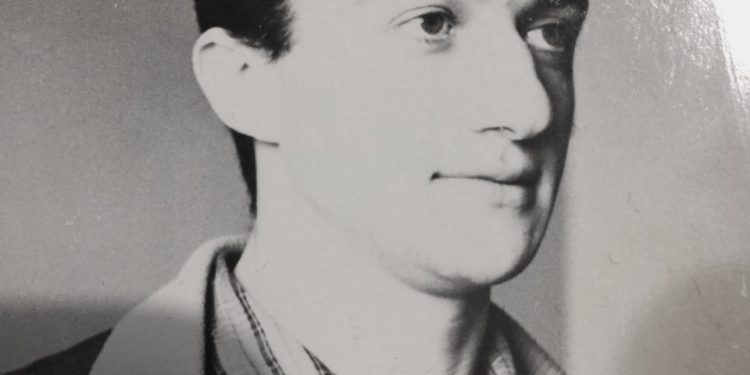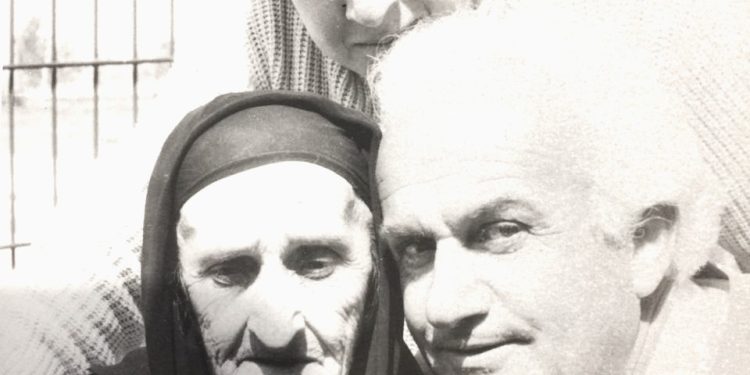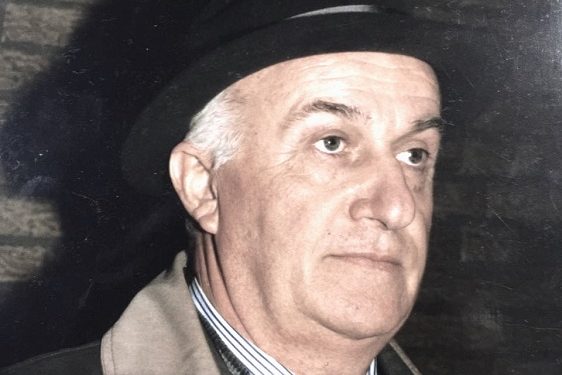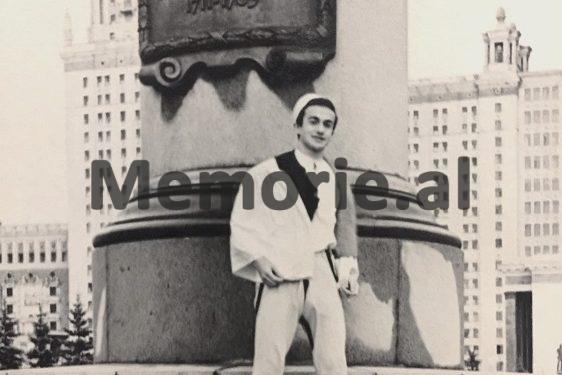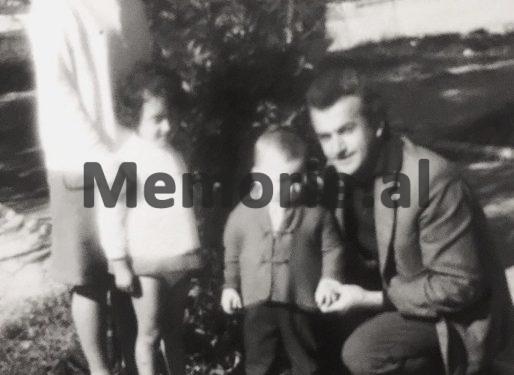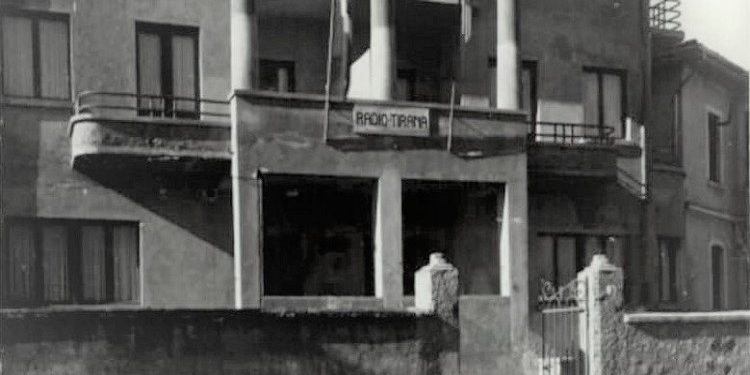From Sokrat Shyti
Part sixteen
Memorie.al / The writer Sokrat Shyti is the “great unknown” who, for several years, has revealed the tip of the iceberg of his literary creativity. I say this based on the limited number of his published books in recent years, primarily the voluminous novel “Nata fantazmë” (Tirana 2014). His novels: “PËRTEJ MISTERIT”, “MES TUNDIMIT DHE VORBULLËS”, “GËRRYERJET E MAKTHIT”, “HIJA E TURPIT DHE E VDEKJES”, “KOLONELI KRYEDHJAK”, “SHPRESAT E NËMURA”, “PËSHTJELLIMET E FATIT” I, II, “MBIJETESA NË KASOLLEN E LOPËS”, as well as other works, all novels ranging from 350 to 550 pages, are in manuscript form waiting to be published. The dreams and initial excitement of the young novelist, returning from studies abroad full of energy and love for art and literature, were cut short early on by the brutal edge of communist dictatorship.
Who is Sokrat Shyti?
Having returned from studies at Moscow State University, right after the rupture of Albanian-Soviet relations in 1960, Sokrat Shyti worked at Radio “Diapazon” (which at that time was located on Kavaja Street), in an editorial office with his journalist friends – Vangjel Lezho and Fadil Kokomani – both later arrested and subsequently executed by the communist regime. Besides the radio, Sokrati, at the age of 21, if we may imagine, had passionate literary interests at that time. He wrote his first novel “Madam doktoresha” and was on the verge of publication, but… alas! Right after the arrest of his friends, to fill the cup, a brother of his, a painter, fled abroad.
Sokrat was arrested in September 1963, and in November of that year, he was sent into internment (together with his mother and younger sister) to a location between Ardenica and Kolonje in Lushnja. For 27 consecutive years, the family lived in a livestock shed made of reeds, without windows, while Sokrat was subjected to forced labor. During these 27 years, he was legally obligated to report three times a day to the regional authority. He had no right to move from the place of internment and was deprived of any kind of documentation, etc. In these conditions, among a livestock shed, he gave birth and raised his children. It was precisely from this event, or rather a very long history of persecution, that he was inspired to write the book “Survival in the Livestock Shed”!
Agron Tufa
Continued from the previous issue
EXCERPT FROM THE BOOK, “SURVIVAL IN THE COW SHED”
The wait until that day felt like it lasted a year, as I was overwhelmed for the first time by such shocks. The genuine smile and warm handshake were enough to create a spring warmth within me. My eyes sparkled when he said to me: – “I read it in one breath; it drew me in like a magnet!
An interesting novel; I liked it! You are always welcome at the Writers’ Union! But for now, I can’t give any opinion on publication, as it must also be read by the responsible comrades. Then it will go through the editorial filters, a procedure followed for all creators. So patience is needed. In my opinion, two urgent important issues must be resolved. First: being cut off from the opportunity to engage in literature, quite some time has gone to waste. Therefore, starting today, I will talk to the comrades in the press organs, hoping there might be a free position, or one can be arranged. Secondly: we will go together as soon as possible to the Ministry of Education, to speak with the First Deputy Minister about getting the right to study Language-Literature as an external candidate.”
Listening to him, it felt like I was seeing a beautiful dream with my eyes wide open! Because I was hearing these surprising promises for the first time from the mouth of an important personality in the field of letters, and I did not believe they would come true.
He went to the counter to speak on the phone with someone, and upon returning, he delivered the surprising news:
– “The First Deputy Minister of Education is waiting for us!”
– “Now, at this moment?!” I asked, quite astonished.
(Of course, I was pleased to believe that his sudden intervention in the party and state organs was primarily spurred by my novel, “Madam Doktoresha.” This thought gave me hope that the neglect and disdain toward me would come to an end, thanks to the attentiveness and kindness of this slight writer, the only one who experienced my spiritual state and was doing everything possible to give me the denied opportunity to showcase my creative literary abilities!). His conversation with the deputy minister unfolded sharply.
For the first time, I had the opportunity to see and hear two high-ranking officials interacting with each other. I couldn’t believe that the slight writer, who was quite composed and calm, used a strict opposing tone in front of the head of the Ministry, saying to him: “You need to look beyond the curtain of bureaucracy! For this case, we are not discussing something trivial, but a completely special phenomenon that requires special attention and care from you. And to avoid putting you in a difficult position in front of the Minister, I’m letting you have this personal statement…” he added in conclusion.
He then sat down to write. “I’m reading it,” he said when he finished: “For several months, I have followed with attention the literary work of Sokrat Thanas Shyti from Lushnja, a student at the State University of Tirana, and I have come to the conclusion that his work in this respect is serious. And now, with all the youth and his limited experience, he has the qualities of a promising prose writer, not only in terms of natural inclination but also in terms of theoretical preparation. Among other things, he is a researcher and simultaneously a passionate worker in literature, although until now, he has been forced to pursue another field…”
Shefqet Musaraj, (Writer)
Tirana, September 8, 1962
“After this statement, signed by me also in my capacity as the Secretary-General of the Writers’ and Artists’ Union, I hope you are quite convinced of the seriousness of the matter we discussed. Therefore, the solution should not be delayed. If you want to archive my statement, I will send it to you officially registered, with signature and seal…”
The First Deputy Minister of Education promised that he would expedite the request without any doubt about its fulfillment, and shaking the writer’s hand, he said that when this matter was resolved, they would have an espresso together at “Dajti.”
The writer’s efforts continued further. Thanks to his energetic and swift intervention, I was offered a job as an editor in the Youth and Children’s program at the Radio Broadcasting, initially on a temporary basis, unnamed, without a defined salary; I would appear on the payroll as a collaborator. As for the financial side, I would be valued according to the ridiculous rates of literary creativity. Despite this status, it was a noteworthy event for me to be employed temporarily as an editor in this important institution, which played the role of the mouthpiece of the state.
“Let’s understand each other,” my benefactor said to me, with a dissatisfied expression, “This temporary solution doesn’t fulfill our mission at all. The editor’s job at the Radio doesn’t leave you time to breathe. It has a crushing workload compared to the editor of print organs, for the fact that, besides writing the program, all the material must be recorded in the studio, and these tasks are performed by the editor: he informs the actors, chooses the accompanying music, talks with the technician! In short: there’s no time left to engage in literary creativity. Here, genuine journalists work, not writers. Nevertheless, we are obliged to accept these conditions since we were given the opportunity to enter the organization. Maybe later, a position will open up in some newspaper or literary magazine!”
I thanked him, telling him that difficult turns always come at a high cost, because in life, it is very rare for desire to align with intention. And I set to work. As a beginner, the head of the editorial team did not assign me the “recording tasks” but gave me the themes for the programs and instructed me to write fairy tales and educational stories for children, no longer than 10 pages.
After these words, a whirlwind of inspiration flooded over me to write: ideas and thoughts began to pour onto the blank pages as if they had been hidden somewhere, on the verge of bursting forth and eagerly waiting to come out!… There were times when I wrote several stories and fairy tales within a day! The boom of inspiration captured the interest of the collective towards my creative work. My friends and colleagues in the editorial team began to read my manuscripts with curiosity. I received congratulations and thanks for my fertile output.
Meanwhile, my rapid and unstoppable progress in creativity caused concern among the finance manager and the personnel manager, who conferred with each other to rein me in and went to the General Director’s office, quite alarmed: they reported to him their observed suspicion, calling it an unusual phenomenon, since the salary of the young journalist at the end of the month significantly exceeded that of the head of the institution, even though a story and a fairy tale are only valued at thirty cents!
– “What should we do?” they asked finally, with frightened looks.
– “He has written so much?!” the director said in surprise.
– “He must have a writing machine brain!” he added in the same tone. “Under these conditions, you urgently need to prepare the papers for his appointment and send them to the Central Committee! And regardless of how long the response takes, the young journalist will be paid a fixed minimum wage, with a little extra for artistic creativity. But after this strange report from the two heads, which seemed extremely paradoxical and unbelievable to the General Director, he summoned his deputy for artistic matters and the head of the editorial team to hear their opinion and professional assessment.
Immediately after returning from the meeting with the institution’s high official, the head of the editorial team entered the room where I was working, smiling, and told me to present myself in the oval office immediately.
– “Surely for good,” she added to reassure me when she noticed a troubled agitation in my eyes. Very soon, whispers began to spread around me in the Radio’s premises:
“Even though very young, he has written a novel, which is located in the Writers’ Union, as he must necessarily pass-through Dante’s nine circles before seeing the light of publication…” The last part of the whispers seriously troubled me: “Dante’s nine circles, before seeing the light of publication!” Because this expression seemed to me like a signal coming directly from the editorial offices of the Writers’ Union, to indirectly inform me that the manuscript of the novel had begun its journey, and the first impressions after reading had appeared, contradictory to each other, but all having one common point: there would be no talk of publication without passing through Dante’s nine circles!
In my opinion, the essence of this barrier was formed by the jealousy of well-known poets and writers, who were haunted by the doubt that the emergence of such a young author with a major work like a novel would naturally ignite their oppositional spirit, creating a serious obstacle for approval. Accepting this opinion as a harsh reality began to irritate me and keep me anxious! Generally speaking, the diversity and monotony of everyday life is shaped by the mix of chance and routine.
But there are fleeting moments of chance that appear like visions and are quickly forgotten, with no impact on the course of our lives. Sometimes they coincide with a wondrous twilight or a gilded dawn, as they bring about profound mental and spiritual changes that transform us.
Something like this happened to me after meeting and getting to know my friend from the office, at the far end of the fourth floor of the building of studios and editorial offices on “Kavajës Street.” After greeting and shaking hands, when I sat in my place across from him, he asked me in a clear voice, without any hesitation, as if we had known each other for a long time:
– “Well, my friend Fadil and I in the Culture editorial office had the chance to work in this profession after completing our studies in journalism at the University of Leningrad. But you, being a chemist, what pushes you to mingle with our talkative crowd, when your nature as a writer demands deep tranquility and complete independence of thought?” …
– “In a way, my coming here was a coincidence…” I replied.
– “Even though I can somewhat guess what compelled you to accept this solution (not simply the intention of staying in Tirana, but rather the necessity to be closer to the field of letters), I still consider this solution a bitter chance!” he added with a sigh. “When we were young…”!
– “You’re still young,” I interrupted him.
– “A young man, a decade older than you,” he emphasized.
– “At your age, the world seemed wonderfully beautiful to me. Have you seen and enjoyed the polar nights, the dazzling auroras?… The auroras were the most fantastical and magical phenomena to me during my five years of study in Leningrad: I loved and adored them! I wished to be close to them!”…
– “These feelings are the signs of a breathtaking, overwhelming love,” I added.
– “Exactly. Perhaps the auroras influenced me directly in my being, wrapping me with such passion for the essence of love…”!
– “So, you must have savored the sweetness of student life?!”…
– “I experienced it with shocking dimensions, because it wasn’t just the light of a flickering candle, but the torchlight of the aurora!” he pointed out with a sparkling gaze. “It was not comparable to fleeting loves, just to sip the nectar of femininity…!”
– “Did you get married?” I asked, feeling anxious.
– “How could it happen otherwise?! We were two twin souls, born for each other! From the blossoming of this love, our daughter was born, our angel…” he said.
– “Oh?!” I sighed, scolding myself for letting our conversation enter such a delicate and touching circle. “I believe you understand in what state I am, when I have left the most sensitive parts of my soul to my wife and daughter. All that remains here before you are just a corpse with a thread of spirit, enough to breathe.”
– “None of us, who were students there, ever expected this painful separation!” I tried to comfort him.
– “Even though you are not a hostage of a true love, in a sense, you have certainly experienced the tragedy of separation, as a direct participant in the fatal event,” he pointed out. “But let’s return to where we started our conversation: you couldn’t find a wiser solution than taking this job here in this institution that suffocates you, only to hope for a little free time for yourself to dedicate to literature?!… But ultimately, it’s better here than being sent to some factory, workshop, or mine, where even a crow wouldn’t find a bone… Anyway. Let’s put a lid on this conversation. That’s enough for an introduction. Now let’s get to work, as the strict boss is also asking for the force!”
Even though our first conversation lasted very briefly, my friend from the office quickly entered my mental and spiritual world, to the point that we both felt as if we had known each other for a long time. Thus, we began to examine and exchange thoughts from time to time on complex life issues (he would analyze them theoretically, while I illustrated them with examples from literature), completing the whole with our two parts.
It was incidental that we touched upon hot philosophical and political topics for which caution was necessary, considering that Vangjel lacked self-restraint; he was explosive, expressing his ideas freely and discussing with great passion, forgetting that in the state radio institution, eavesdropping was a constant presence. Therefore, one day, I found it reasonable to express my concerns, pleading with him to be more cautious, explaining that spies were constantly around us, starting from our colleagues here, even among those who appeared to be soft.
– “It’s enough to consider how they waste time without doing anything concrete and how as editors they do not touch it at all…” I emphasized in the end. But my office mate took my warning quite lightly, even laughing when he saw me so worried. He did not accept that precisely this unrestrained freedom, which became increasingly gnawing during the examination of sharp philosophical topics, especially on Monday and Tuesday evenings, from five to eight, when we were exhausted from the day’s overload and wished to rest a bit. Unable to contain his inner anger, he described the injustices of the time as masquerades that needed to be uprooted.
I looked him straight in the eye, pleading through my gaze for him to suppress his dangerous thoughts, convinced that some among us were recording our entire conversation with pocket tape recorders. But my efforts were in vain, as his excessive self-confidence regarding his bold ideas urged him to continue further. He expressed them without any hesitation, not considering them forbidden thoughts at all, and he refused to acknowledge that precisely these were the germs of the physical annihilation of individuals with such beliefs. All my attempts to lead him into the pit of restraint, especially to avoid openly unraveling with the “hairy types” (when he happened to converse with them), fell on deaf ears!
And precisely this disregard, the erroneous assumption that the “hairy types” were incapable of extracting a hair from the fluff, let alone conducting such sharp observations of revolutionary vigilance, led him to a fatal mistake: he unwrapped and blindly entrusted one of the “hairy types” with his inner secret, which he had been mulling over for a long time, that he wanted to escape, along with his study friend, convinced that this mountain dweller, having “anti-communist inclinations,” would help him secretly cross the border in that area where he was born and raised and knew the terrain like the palm of his hand!
In the last week before the incident, he appeared quite agitated. He came and went silently. He often met his study friend in the corners of the long corridor. They whispered for long minutes and parted with expressions of dissatisfaction toward each other. Whenever I saw him in that tense state, my intuition told me that my friend was on the verge of making a very alarming decision, that his excessive self-confidence was pulling him toward the abyss, and even his university study friend could not turn him back!
His agitation took on such arrogant dimensions that he wouldn’t even accept to exchange thoughts with me, his office mate! I had no choice but to silently pray that he would come to his senses and not plunge headfirst into the blind path where a fatal punishment awaited him! At precisely those moments, he smiled at me and looked at me with a brotherly longing, without giving an answer, as if to say: “Don’t bother yourself in vain with me. I’ve decided; I won’t change my mind! Take care of yourself because you never know where fate’s wheel will lead you…!”
On Tuesday, at eight in the evening, when I descended the four flights of stairs, I noticed something unusual at the exit: the lighting was missing inside the guardhouse where the service officers stayed! – “Who are you waiting for?” a voice asked me, echoing eerily from the distant void.
– “Fadil,” I replied, glancing toward where the voice came from. “Because he told me upstairs to walk together.”
– “You go. Go! Fadil has an urgent service,” the voice added.
When I exited through the iron door, a “Gaz”-69 drove past my feet: my intuition whispered to me that Fadil was inside it. Maybe he had come down before me, and the car of his brother, the general, was there to take him for an urgent family matter. Nonetheless, the lack of lighting in the observation space and the voice in the dark left a bitter taste. I was particularly struck by Fadil’s repeated request to make the journey together: could he have meant to tell me something about Vangjel’s absence?
The next morning, an urgent meeting was held in the large recording studio. The General Director and the secretary of the basic organization of the Party informed us in a harsh tone, delivering the most shocking news: “Two employees of our Radio Broadcasting, Vangjel Lezho and Fadil Kokomani, were arrested last night by our Proletarian Dictatorship authorities and declared enemies of the Party and the people! For further details, additional announcements will follow!”
Even though I was sitting in the last row, it felt as though the eyes of the room were fixed on my pale face, and from the malicious gazes, sparks of pleasure at this turn of events spread, openly expressing anger and hatred towards our two former colleagues, and indirectly towards me as Vangjel’s office mate, convinced that my turn would soon come to be banished somewhere!… (Some of these chilling experiences are described in the first volume of the novel “The Confusions of Fate,” which you will have the chance to read when it is published). Memorie.al
To be continued in the next issue
Copyright©“Memorie.al”
All rights to this material are exclusively and irrevocably owned by “Memorie.al”, in accordance with Law No. 35/2016 “On Author’s Rights and Related Rights”. It is strictly prohibited to copy, publish, distribute, or transfer this material without the authorization of “Memorie.al”; otherwise, any violator will be held liable under Article 179 of Law 35/2016




